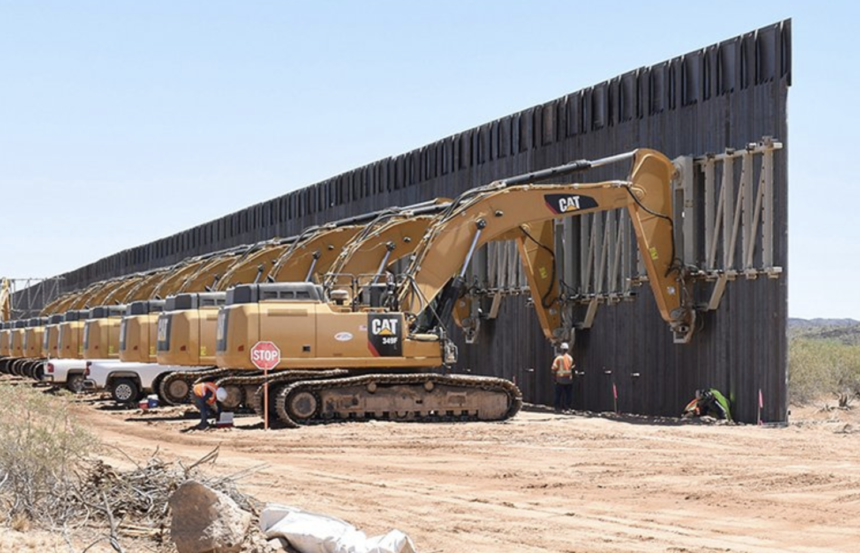Court affirms ruling that Pentagon funding of border wall is ‘unlawful’

PHOENIX – Just days after President Donald Trump was in Yuma to praise construction of the border wall last week, a federal court reaffirmed its ruling that the administration’s method of funding that construction was “unlawful.”
The ruling Friday by a divided panel of the 9th U.S. Circuit Court of Appeals said that the administration’s plan to divert $2.5 billion in Defense Department funds toward construction of the border wall – funding Congress had specifically rejected – was unconstitutional.
But in a dissent, Judge Daniel P. Collins said the transfers were lawful, repeating his earlier stance in this case, which has already been to the Supreme Court once and sent back to the 9th Circuit for review.
Calls seeking comment from the departments of Justice, Defense and Homeland Security were not immediately returned. But border wall opponents hailed the decision as a “critical step in upholding the checks and balances that are integral to our democracy.”
“We welcome the … court’s decision to permanently stop Trump from building his dangerous and deadly wall,” said Vicki Gaubeca, director of the Southern Border Communities Coalition, in a statement Monday.
Her group, along with the Sierra Club, had sued to block the use of Pentagon funding for sections of the wall planned for the El Paso, El Centro, Yuma and Tucson sectors of the border. It was the completion of the first 200 miles of border wall that brought Trump last week to Yuma, where he promised to have “complete 450 miles by the end of the year, and 500 miles, almost immediately thereafter.”
Some of the current stretches of wall were paid for with the Pentagon funding that was the product of standoff between the White House and Congress in late 2018.
The administration had demanded $5.7 billion for border wall construction in the fiscal 2019 budget. When Congress rejected the request, Trump refused to sign the budget, leading to a 45-day partial shutdown of the government, the longest in history.
Congress ultimately passed a budget that included $1.375 billion for border wall construction limited to “primary pedestrian … fencing in the Rio Grande Valley Sector.”
As Trump signed the budget, ending the shutdown, he also declared a national emergency at the southern border that he said allowed him to secure “additional resources” to build the wall, including $8.1 billion from other sources.
Included in that amount was $2.5 billion shifted from the Pentagon under a section of the Defense Department budget that allows the transfer of up to $4 billion for “unforeseen military requirements.”
But that section, section 8005, also denies transfers “where the item for which funds are requested has been denied by Congress.” Critics said that’s what Congress had done on the border wall and that the administration could not legally transfer the funds.
A federal district court agreed and blocked the transfer of funds in 2019, a decision that was upheld by the 9th Circuit. But the U.S. Supreme Court overturned that stay in July and ordered the circuit court to reconsider the case.
The 9th Circuit did and came to the same conclusion Friday, finding that the fund transfers “were not authorized, and that plaintiffs have a course of action.”
“These funds were appropriated for other purposes, and the transfer of funds amounted to ‘drawing funds from the Treasury without authorization by statute,'” said the decision by Chief Judge Sidney R. Thomas.
Thomas rejected the government’s argument that the transfer was needed to stop the flow of drugs across the border, noting that Congress and the Justice Department both said the wall was not the most effective way to accomplish that.
“No matter how great the collateral benefits of building a border wall may be, the transfer of funds remains unlawful,” Thomas wrote.
In his dissent, Collins argued that the funds transfer violated the regulations only if it exceeded the $4 billion limit, which it did not. While he agreed that the Sierra Club and SBCC had standing to sue, he said he would have reversed the district court’s decision and ordered it to rule in favor of the government.
Rep. Raul Grijalva, D-Tucson, welcomed the court’s ruling in a statement Friday.
“This court ruling reaffirms what we already knew: The Trump administration broke the law when it stole congressionally-appropriated funds from the Defense Department to build his ridiculous vanity wall,” Grijalva said.
Gaubeca said her group is “trying to figure out what the best approach is” in their next steps on the border wall. But she said this is not the end of the fight.
“No matter what, we’re not going to give up against this wall. We won’t stop until we see it torn down with the environment, wildlife and communities restored,” she said Monday.